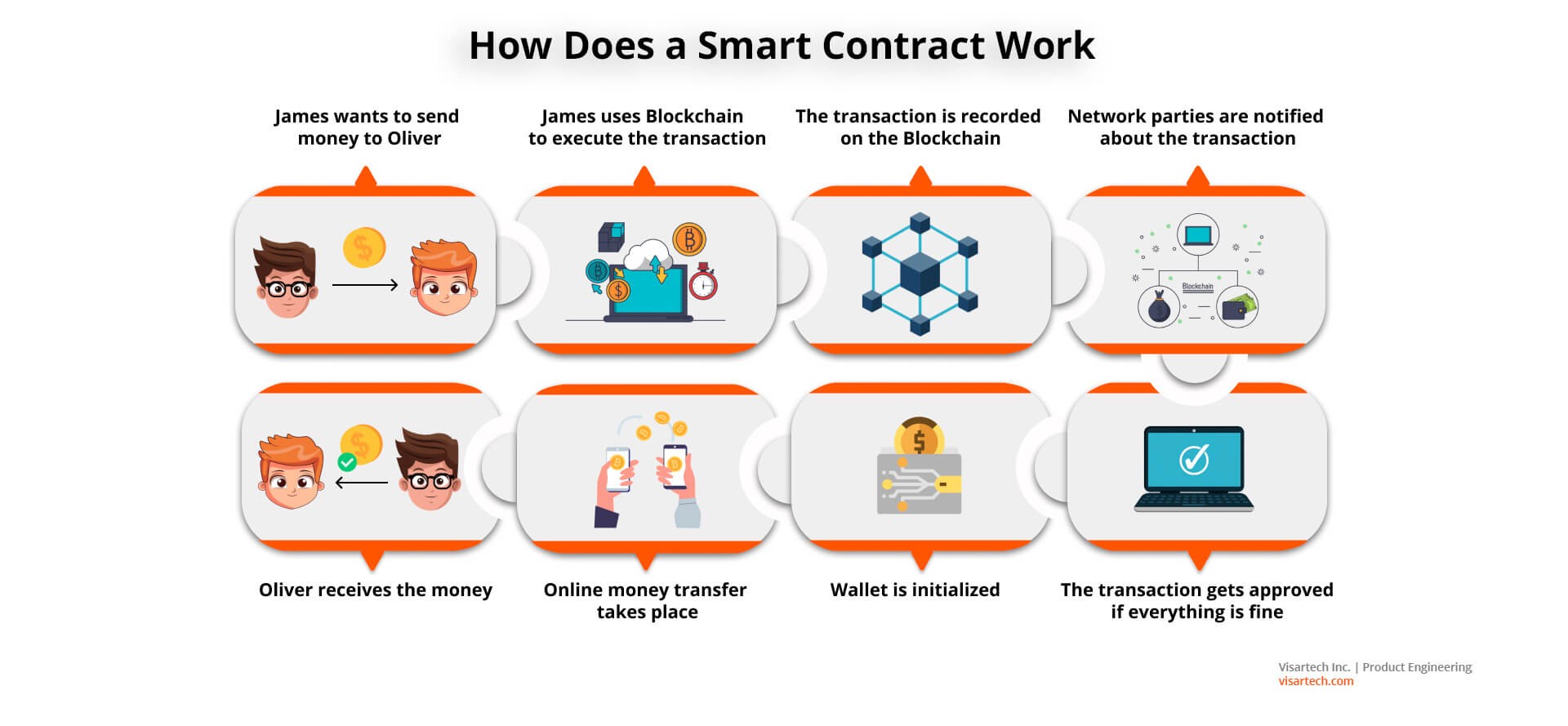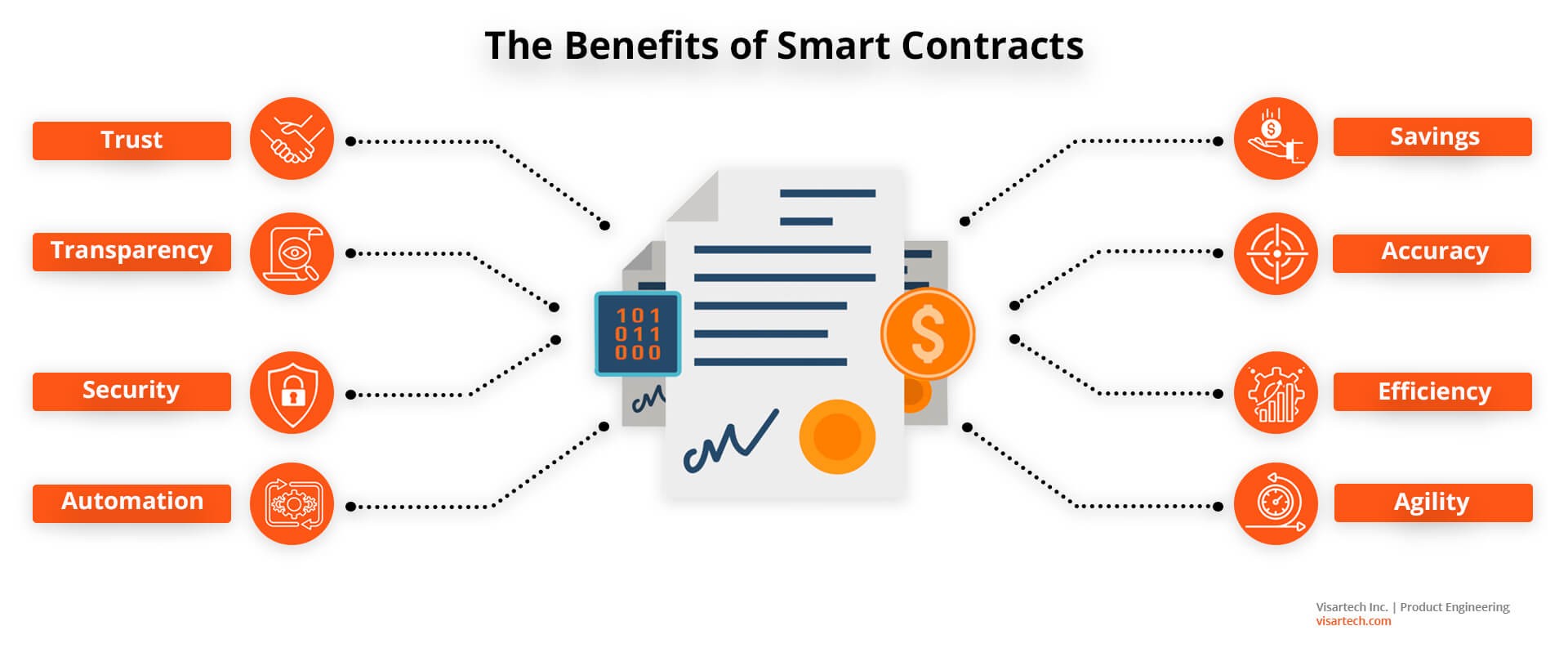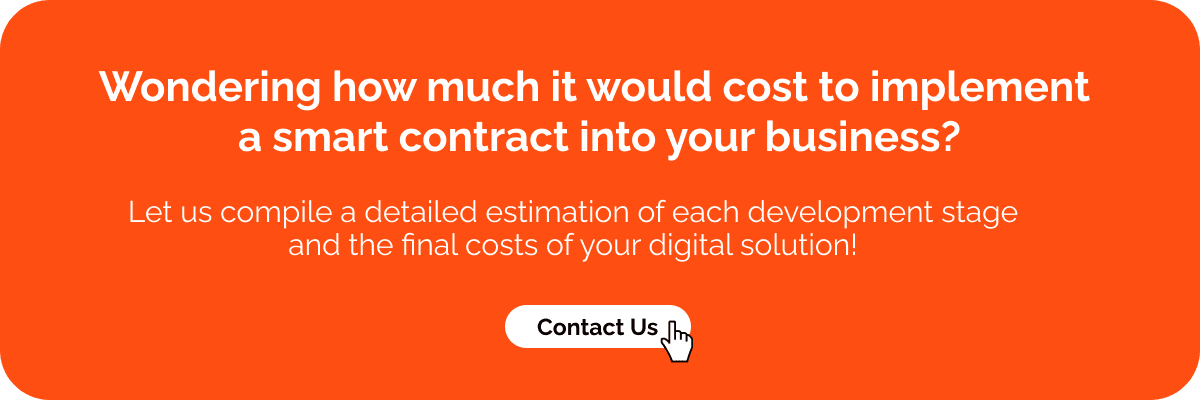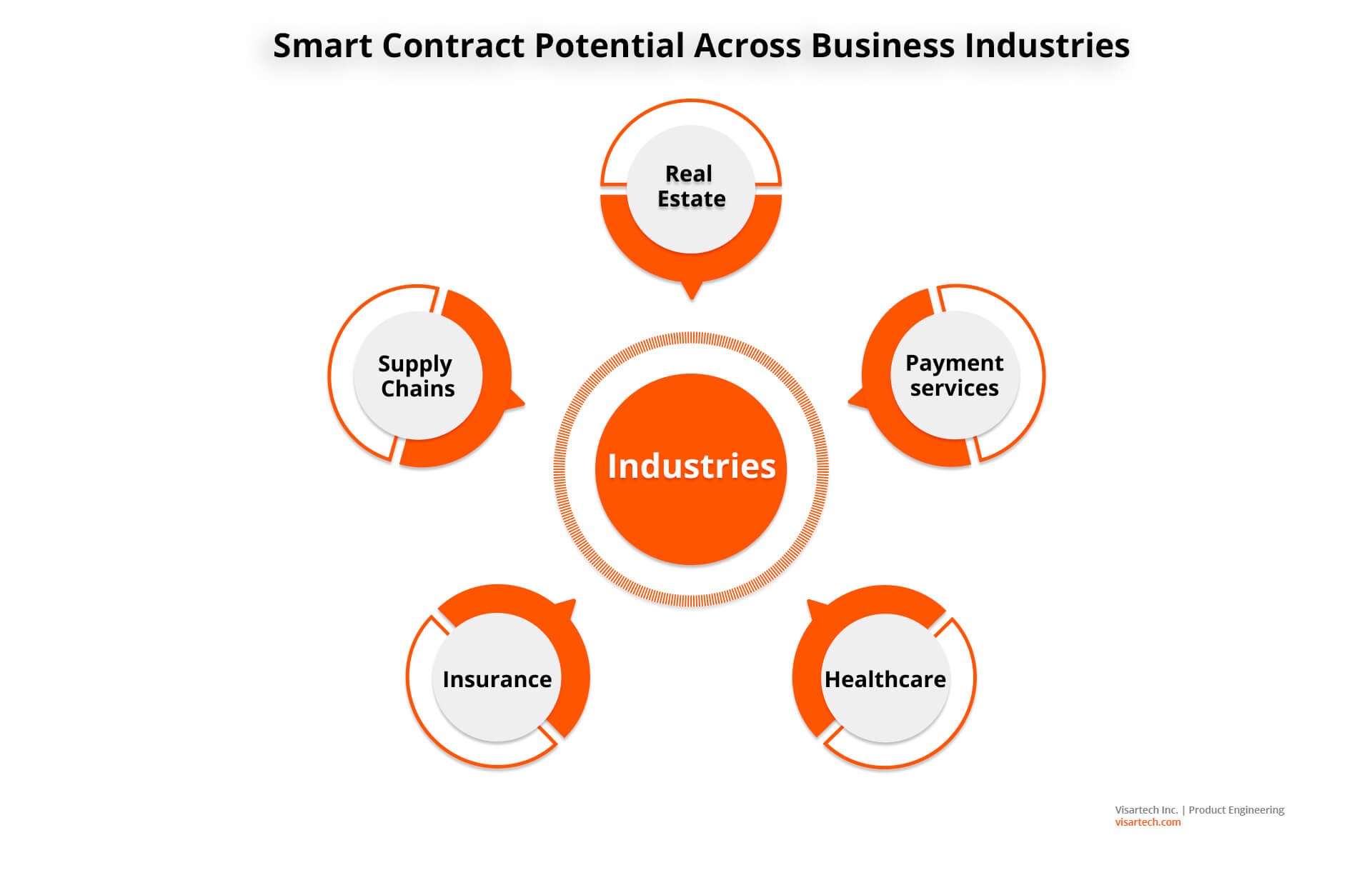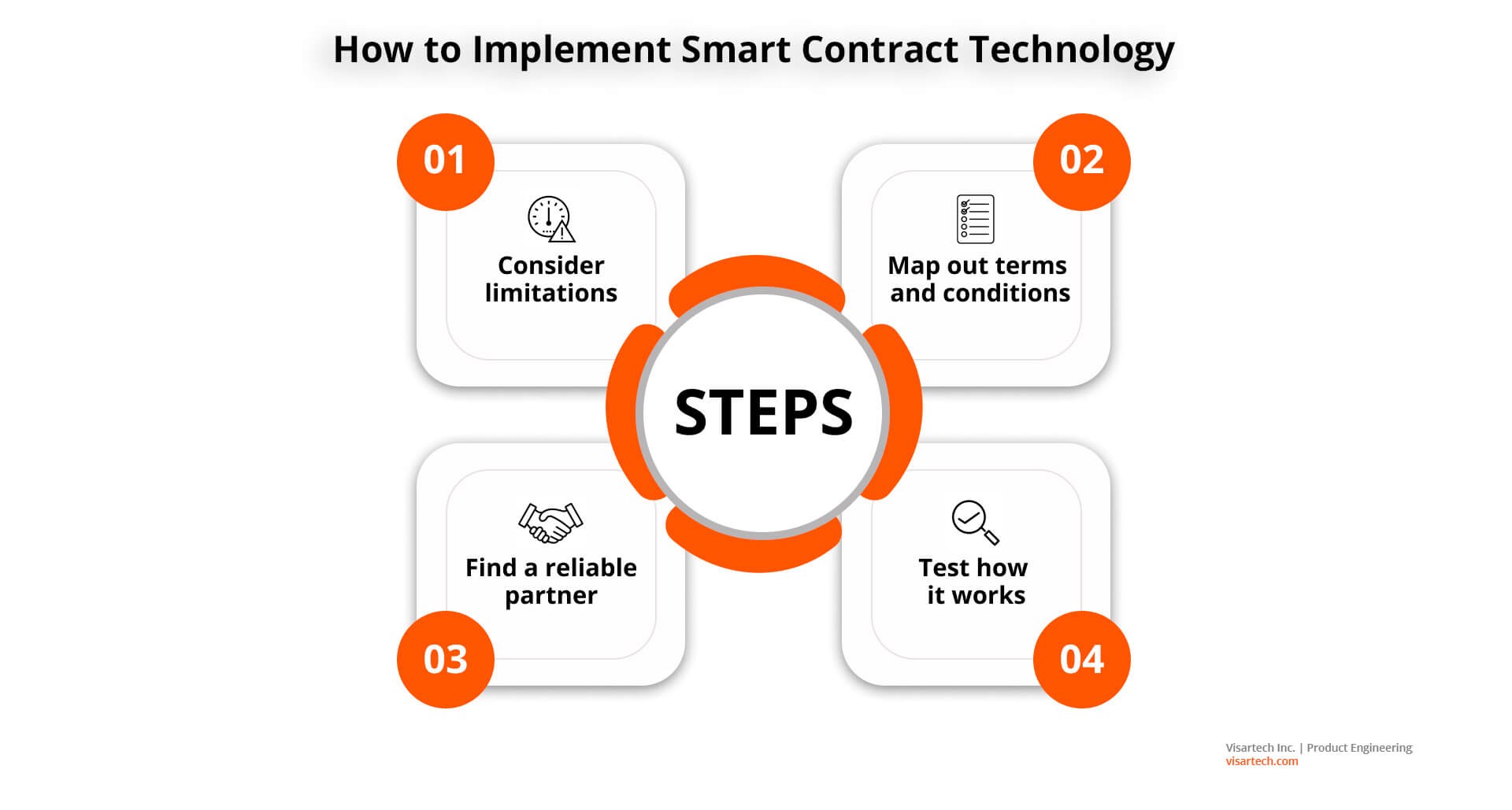According to Gartner, companies spend at least 3% of their revenue on paper, printing, storage, etc. Traditional contracts eat up a lot of time and investments that could have been spent otherwise. This made smart contract development popular among companies worldwide.
The main challenge of embracing this technology is that many people have the wrong idea about it. Especially when unfamiliar with blockchain or Web3. In this article, we will have smart contracts explained. You will learn what smart contracts are and their key functioning principles. Most importantly, we’ve prepared some real-world smart contracts use cases. That will give you an idea of how this technology can align with your business.
Understanding The Basics: What Are Smart Contracts?
Smart contracts were first proposed in the early 1990s by Nick Szabo, cryptographer, and Juris Doctor. He suggested that information about deals should be kept in Distributed Ledger Technology (DLT), which was made to work as an online accounting book.
The point was to transform traditional agreements that had no other alternatives into an entirely new, progressive digital format. However, all of this became a reality only in 2015 when the Ethereum network hit the market. It is a blockchain-based platform for developing decentralized apps (DApps). The company utilizes Ether, sometimes known as ETH or Ξ, as the platform’s native currency.
In today’s world, a smart contract is a digital instrument that outlines the terms of the deal and enables its automatic execution. It is a program that encodes all the transactions and any other procedures required to fulfill a deal. It runs itself and takes into account all protocols, financial systems, and even communication with government agencies.
How Do Smart Contracts Work?
All digital contracts are executed on Ethereum Virtual Machine, i.e., decentralized networks with distributed ledgers. This means that there isn’t a single specific server and all information is stored in blocks. Each user acts as a processor that confirms specific contract terms. All data is written down the chain, thus, changing the state of the blockchain. Users can view data while the system’s state remains unchanged.
The developers use the JavaScript-like programming language Solidity, which was created specifically for writing self-executing agreements. The document itself is a decentralized application (DApp), or, to put it another way, a byte code that is transmitted to the community.
Interactions with tokens. Tokens are a key part of how users interact with digital contracts. Tokens can be made out of just about anything these days. You can encode any asset, whether it’s physical possession of a legal right, such as the rights to the rented property and art pieces, or the agreements for the delivery of oil. Speaking of software development, even an entire product can be tokenized.
One of the most popular examples of tokenization is non-fungible tokens (NFTs) that are minted through blockchain smart contracts. Real-world objects, such as artwork, music, video game goods, and films, are represented digitally by NFTs. They allow you to assign ownership and manage the transferability of the NFTs.
The algorithm follows the pattern ‘if-then’ pattern, which clearly prescribes the possible user actions and thus gives a result in a response. This code contains all the parameters, functions, and other details needed to decode all transactions.
The executions stages are as follows:
- Defining the subject. Say there is a software solution that you wish to offer to your customers. You encode all agreement points and send them to the network.
- Making a deal with the customer. All contract terms are public to all parties, so anyone can discuss them before making the agreement.
- Confirmation of the deal. Blockchain makes sure that both parties meet all the requirements. You and the customer just use an electronic signature to agree to collaborate.
- The transaction will now take place. After then, the money is withdrawn and sent to the recipient. The first record, as well as all the following ones, are created by the code. This continues until all of the obligations outlined in the contract have been satisfactorily met.
How Can Smart Contract Development Simplify Business Processes
The smart contract blockchain algorithm provides significant value to organizations. The value lies in simplifying all operations by making transactions as simple and transparent as possible. All of the tasks are executed by the system, as well as controlled and recorded by it. There are no other duties that the parties can complete behind the curtains.
You may be certain that all parties will execute their commitments in the manner that they have committed to. There are no legal blunders, risks of manipulation, or fraud. In simple words, it works by the principle: “I did this so that I could have that. I didn’t complete this, so I didn’t get that.” Everyone is on equal terms, and it is impossible to cheat or spend bitcoin twice.
Key Benefits of Creating Smart Contracts for Businesses
Automation is one of the obvious benefits of smart contracts, but not the only one. Let’s take a closer look at what else smart contracts have to offer:
- Trust and Transparency
Once deployed, neither of the parties can change the terms of the contract to gain personal benefit. In addition, all terms are visible to parties, therefore everyone can track the execution of a contract and review the information about the transaction.
- Security
Each record is connected to the preceding and following records. This means that hackers must reconstruct the entire chain to change a single record on the ledger. Furthermore, while records are accessible to anybody, the parties’ anonymity is retained. The names of the parties and other private details are not revealed.
- Automation
In contrast, standard contracts allow for the possibility that one or both parties will cheat, ignore certain aspects of the agreement, carry out the terms in a different manner, or fail to carry them out at all.
Here it is impossible because of automation. There is no need for any kind of middleman because all the work is completed mechanically. In addition, because everything is handled by software, there are no instances of fabricated data, non-compliance with any part of the contract, etc.
- Reduced Expenses
Because of automation and encryption, business owners can significantly cut down on operational costs. According to Accenture, investment banks alone could save $8 billion per year by adopting smart contract technology. All transactions are completely visible to all parties involved, and no multiple intermediaries are required to conduct and monitor complicated payments. Instead, anyone can streamline all operations in real time by themselves. Consequently, there are no fees, charges, or commissions to pay.
- Accuracy, Efficiency, and Agility
Again, automation speeds up all the steps that need to be taken. Because the programming assures the contract’s performance, you receive accuracy. As soon as the prerequisites are met, the required action is performed and it is always the same, no matter who steps into the deal.
How Different Industries Use Blockchain Smart Contracts
Supply chains, financial institutions, insurance agencies, and many more are brilliantly utilizing digital contracts to reduce administration and service costs. Let’s analyze the smart contract use cases across different industries:
Real Estate
Real estate smart contracts are altering the process of buying and selling apartments. They create a single system that is capable of operating on its own and combines the functions of notaries and brokers. It is not necessary to engage in price negotiations, alter the title, or carry out any of the other activities that attorneys and property investment brokers are typically responsible for.
RealT is a great example of how tokenization can facilitate simpler communication between purchasers and sellers. They use a token-based network that complies with all applicable regulations. This make it possible for users from all over the world to invest in the housing market.
Payment Services
Many loan servicing functions, such as collecting and disbursing payments, tax authorities, and insurance companies, can be handled by digital contracts. Every operation is fully encrypted, accountable to the public, and autonomous. They are suitable for use in both internal and external banking operations. Also, by making the process easier, they have taken away any chance of a human making a mistake.
Read more: Fintech Revolutionizing the Finance Industry
Your comprehensive guide through the world of fintech
Healthcare
Keeping track of the health records of a large number of people who need medical care is a common challenge for medical staff. Digital contracts, in turn, can encode all medical data and information into electronic health records.
As a result, the patient’s doctor can access all the records at any time and react to the problem faster. One example of such implementation is Medicalchain, a company that gives patients and doctors more control over medical information. The system helps to avoid long lines and makes it easier for healthcare workers to process patient requests.
Insurance
The present insurance system is expensive and lacks trust among parties and stakeholders. This problem may be solved by using digital assets for insurance instead of generating massive paper agreements.
Among companies that already utilizing the technology is Fizzy. This company handles claims related to airline delays. Databases that track air traffic all around the world are connected to a contract that provides financial compensation for delays lasting more than two hours.
Supply Chains
Smart contract technology may be attached to a product from the moment it is put into a truck or carried to its destination, as well as from other crucial points in the supply chain and procurement automation. When the product has been delivered, payments are distributed to all parties involved in the supply chain in accordance with the specifications of the document. If a company’s stock drops below a specific level, the system can also notify the company that it has to reorder a product.
4 Main Steps to Create Smart Contracts
Based on our expertise at Visartech, the steps to smart contract development are:
#1. Consider limitations
There’s a reverse side of automation. It is almost impossible to update a smart contract. The Internet offers some solutions but they are far from being reliable. Smart contracts are immutable by default. Also, pay attention that the technology runs on the “if-then” logic. This might come as a limitation for those in need of sophisticated variations.
#2. Plan
Create a list of terms and conditions related to your case. Make a detailed plan of how all of your transactions will be handled. Under what conditions do this or that action take place? Write down rules on what happens if these actions are not performed.
Read more: 10 Reasons to Write a Product Tech Specification
Learn how to make software development more cost-effective
#3. Find a trustworthy partner
Opt for a smart contract development company that understands your business needs. You also want to make sure that the potential tech partner has a deep understanding of decentralized technologies, networks, consensus mechanisms, and other tools.
#4. Test the smart contracts
Where there’s code, there’s room for bugs and security gaps. Make sure there’s a proper smart contract audit in place before it goes live. Other than that, check how the contract executes itself. Have a few people use it and, maybe, try to break the agreement, to ensure everything works as expected.
Conclusion
Smart contract development has become one of the most sought-after technologies in recent years. No wonder, as they help solve a variety of issues. Moreover, this sophisticated technology facilitates trust in the digital world and has all the potential to transform conventional business practices.
Our team can help you navigate the world of blockchain, draft the smart agreement so it meets the specific needs of your business, and help implement it into your processes. The best way to make sure you create smart contracts correctly is to choose a trusted smart contract development company.


